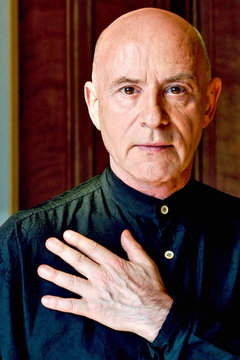Goerne and Eschenbach deliver memorable Schubert journey

With Christian Gerhaher’s cancellation of last month’s scheduled Winterreise, it fell to Matthias Goerne and Christoph Eschenbach to kick off Symphony Center’s Schubert Song Series with Die schöne Müllerin Sunday evening.
Goerne and Eschenbach have performed Schubert’s three great song cycles at Ravinia in recent years to considerable acclaim yet it was heartening to see the return of serious lieder recitals to downtown Chicago. The audience was smallish—not quite filling the main floor where all were seated—but attentive and remarkably quiet during Schubert’s hour-long journey.
Schubert’s twenty-song cycle follows the narrative of a young miller. The songs begin cheerfully with the initial settings showing a confident and energetic youth. A third of the way through, the lad falls in love with the title beautiful miller maid. Ultimately, he loses her to a huntsman, which leads to his tragedy and eventual suicide.
The surface narrative doesn’t reflect the depths of Wilhelm Müller’s poetry, with its complex symbolism and leitmotifs of nature, green, and the brook—a friend and confidante to the young man, eventually beckoning him to his death. Schubert’s fecund, melodically rich music depicts the evolving emotional state of the protagonist with a degree of unsparing psychological penetration that is almost clinical.
Goerne and Eschenbach have recorded the Schubert cycles and performed them together around the world, yet there was not the slightest hint of routine in Sunday night’s riveting performance. The partnership between the two men was extraordinary with Eschenbach’s piano amplifying and expanding on Goerne’s vocalism in virtually symbiotic fashion.
Goerne’s dark baritone and dramatic style are especially well suited to the shadowy existential angst of the later settings yet he was a fully invested protagonist from the get-go: strong and confident in the opening “Das Wandern” and “Wohin?” and displaying a slightly not-quite-right degree of boastfulness in a declamatory “Am Feierabend.”
For such an ample voice, Goerne handled the faster songs with striking clarity and rhythmic alacrity, as with his vehement anger at his romantic rival in “Der Jäger.” The singer also conveyed the folksong-like simplicity that is at the heart of Schubert’s art, as with the penultimate setting “Der Müller und der Bach,” while plumbing the varied expressive depth of each song.
The highlights in this performance were many: the existential bleakness of “Die liebe Farbe,” the romantic intimacy of “Tränenregen,”and the final song “Des Baches Wiegenlied,” with Goerne’s soothing, persuasive singing as the brook beckons the miller to end his suffering, almost making you want to jump into your grave (or brook) and join him.
Yet the finest moment came with “Der Neugierige.” The most beautiful song of the cycle—where the smitten miller begins to doubt his infatuation—Goerne’s hushed, inward caressing of the vocal line was simply spell-binding.
As in previous collaborations, Eschenbach—who had conducted the Boston Symphony Orchestra the previous evening—was a full partner with Goerne, bringing an equally terraced array of hues and dynamic detailing to his piano playing.
The Schubert Song Series concludes May 11 with soprano Susanna Phillips and bass Eric Owens. cso.org; 312-294-3000.
Posted in Performances




Posted Jan 23, 2014 at 9:28 pm by Richard
The audience was smallish bec Symphony Center has become very greedy in the last few years. Tickets for this concert were a whopping $55, where once one had the option of seats in the gallery in the lower twenties. CSO concerts have also gone up, with Muti concerts starting in the 50s for a gallery seat. No wonder whole sections remain empty even when Muti himself is conducting.
Posted Jan 25, 2014 at 9:08 pm by Edward
Sections were empty because only middle main floor seats, boxes and stage seats were for sale.
Posted Jan 26, 2014 at 3:55 pm by Richard
???
That the upper floors were closed off was made clear in the review. It said that only the main section was used, yet “the audience was smallish”…
I dearly wanted to go to this but seriously couldn’t afford another $50+ ticket. Too many of them each season puts a big dent on the budget. It doesn’t help that, in addition, Lyric of all the important opera houses in the world is the only one that doesn’t offer standing room tickets (bec of our codes). And the cheapest seats are not just too expensive but are abysmal for both sound and sight to boot.
I remember that in the 90s and most of 00s I went virtually every week (sometimes twice a week) to Orchestra Hall. With prices at $50+ and this economy now, I simply have to pick and choose carefully. I wish Symphony Center wouldn’t be so greedy and would be enlightened enough to sell rush tickets for their empty seats, and not just for students or seniors…
Posted Jan 26, 2014 at 4:01 pm by Richard
I was at Muti Macbeth earlier this season in the gallery and was shocked that this section (the cheapest ticket in the house at $55 or so; but with very fine acoustics) was only 60% full. Really?!! I fully expected mobs fighting for return tickets at the counters…